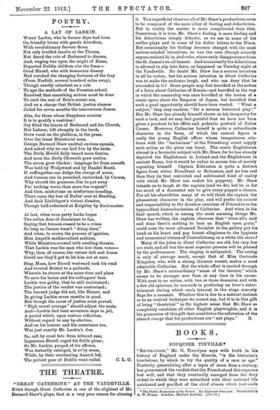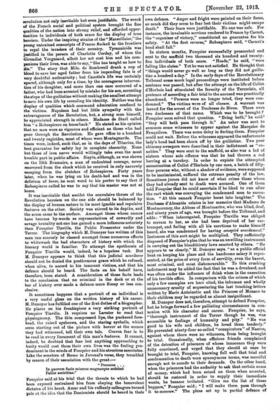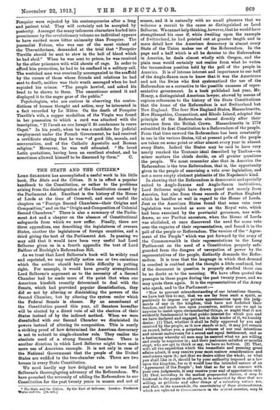BOOKS.
FOUQUIER TINVILLE.* "REVOLUTION," Mr. G-. Trevelyan says with truth in his history of England under the Stuarts, "is the historian's touchstone, by which to try the quality of a race or age." Posterity, generalizing after a lapse of more than a century, has pronounced the verdict that the French stood this supreme test well, and that they eventually emerged from the fiery ordeal to which they were submitted with their national life quickened and purified of the chief abuses which had made
• The Public Prosecutor of the Terror. By Alphonse Dunoyer. Translated by A. W. Evans. London: Herbert Jenkins. 0.2s. 6c1.3 revolution not only inevitable but even justifiable. The wreck of the French social and political system brought the fine qualities of the nation into strong relief, and afforded oppor- tunities to individuals of both sexes for the display of true heroism. Under the inspiring strains of the" Marseillaise," the young untrained conscripts of France flocked to the frontiers to repel the invaders of their country. Tyrannicide was justified in the person of Charlotte Corday, of whom the Girondist Vergniaud, albeit her act cost him and his com- panions their lives, was able to say, "She has taught us how to die." The story that Mlle. de Sombreuil drank a cup of blood to save her aged father from his impending fate is of very doubtful authenticity ; but Cazotte's life was certainly spared, although only for a time, by the courageous interven- tion of his daughter, and more than one case occurred of a father, who had been arrested by mistake for his son, mounting the steps of the guillotine without making the smallest attempt to save his own life by revealing his identity. Neither was the display of qualities which command admiration confined to the victims. Napoleon had but little sympathy with the extravagances of the Revolution, but, a strong man himself, he appreciated strength in others. Madame de Steel called him "a Robespierre on horseback." He stated as his opinion that no men were BO vigorous and efficient as those who had gone through the Revolution. He gave office to a hundred and twenty regicides, most of whom were idontagnards. The times were, indeed, such that, as in the days of Tiberius, the best guarantee for safety lay in complete obscurity. None but those of iron nerve would willingly take even the most humble part in public affairs. Sieyes, although, as was shown on the 18th Brumaire, a man of undoubted courage, never recovered from the shock which he. received in only narrowly escaping from the clutches of Robespierre. Forty years later, when be was lying on his death-bed and was in the delirium of fever, he sent word to his porter to say that if Robespierre called he was to say that his master was not at home.
It was inevitable that amidst the convulsive throes of the
Revolution heroism on the one side should be balanced by the display of human nature in its most ignoble and repulsive features on the other. Society was stirred to its depths, and the scum came to the surface. Amongst those whose names have become by-words as representatives of cowardly and savage brutality not one has gained a more infamous notoriety than Fouquier Tinville, the Public Prosecutor under the Terror. The biography which M. Dunoyer has written of this man can scarcely be classed amongst those numerous efforts to whitewash the bad characters of history with which the literary world is familiar. To attempt the apotheosis of Fouquier Tinville would, indeed, be a hopeless task. But. M. Dunoyer appears to think that this judicial murderer should not be denied the posthumous grace which he refused, when alive, to accord to his innocent victims, and that his defence should be heard. The facts on his behalf have, therefore, been stated. A consideration of those facts leads to the conclusion that no criminal in the dock or at the bar of history ever made a defence more flimsy or less con- clusive.
It sometimes happens that a portrait of an individual is
a very useful gloss on the written history of his career. M. Dunoyer has fulfilled one of the first duties of a biographer. He places on his frontispiece a very striking portrait of Fouquier Tinville. It requires no Lavater to read that physiognomy. The thin compressed lips, the puckered fore- head, the raised eyebrows, and the staring eyeballs, which seem starting out of the picture with horror at the scenes they had witnessed, tell their own tale. Craven fear is to be read in every lineament of this man's features. It cannot, indeed, be doubted that fear lest anything approaching to lenity would cost them their own lives was the feeling pre- dominant in the minds of Fouquier and his atrocious associates. Like the senators of Rome in Juvenal's verse, they trembled by reason of their association with the great :—
" Proeeres . . .
In quorum facie miscrae magnaeque sedebat Pallor amicitiac."
Fouquier said at his trial that the threats to which he had been exposed restrained him from obeying the benevolent dictates of his heart. Atuar and his ruffianly colleagues turned pale at the idea that the Dantonists should be heard in their own defence. "Anger and fright were painted on their faces, so mach did they seem to fear lest their victims might escape death." Their fears were justifiable. No one was safe. For instance, the invaluable services rendered to France by Caret, the "organizer of victory," constituted no guarantee for his safety. "At the first reverse," Robespierre said, "Carnot's head shall fall."
In sixteen months, Fouquier successfully prosecuted and sent to the scaffold two thousand six hundred and twenty-
five individuals of both sexes. "Heads," he said, "were falling like slates." Yet he was not satisfied. He thought that "things would never go well so long as they did not guillo- tine a hundred a day." In the early days of the Revolutionary Tribunal some mock legal proceedings were instituted before sentence was passed, but after the attempt on the life of Collet d'Herbois had stimulated the ferocity of the Terrorists, all pretence of according a fair trial to the accused was practically abandoned. "Persons were no longer tried, they were con- demned." The victims were of all classes. A warrant was issued for the arrest of the Duchesse de Bison. There were
two duchesses of that name. Which was to be brought ? Fouquier soon solved that question. "Bring both," he said "they will both pass through it." An usher was sent to summon some witnesses to appear against the Marquise de Feuquii:res. There was some delay in finding them. Fougnier could not wait. Before the witnesses appeared the unfortunate
lady's head had been shorn off by the guillotine. Two poor chimney-sweepers were described in their indictment as "ex-
nobles." They were sent to the scaffold, as also was a lad of
sixteen whose sole offence was that he had thrown a red herring at a turnkey. In order to expiate the attempted
assassination of Collot d'Herbois by one man, a batch of fifty- four persons who, without a shadow of evidence, were supposed to be incriminated, suffered the extreme penalty of the law.
Sometimes jurors did not know of what crime those Whom they had already sent to death were accused. One of them told Fouquier that he could ascertain if he liked to run after the cart which was conveying the condemned men to execu- tion. "At this remark Fouquier burst into laughter." The Duchesse d'Abrantes relates in her memoirs that Madame do Montmorency, the Abbess of Montmartre, who was blind, deaf, and ninety years of age, was brought before the Tribunal, and adds : "When interrogated, Fouquier Tinville was obliged to scream to her, as she had been deprived of her ear- trumpet, and failing with all his exertions to make himself heard, she was condemned for having conspire sourdement."
Instances of this sort might be multiplied. They sufficiently disposed of Fouquier's plea that he was an unwilling instrument in carrying out the bloodthirsty laws enacted by others. "He appears to us clearly," M. Dunoyer says. "as a public official bent on keeping his place and the handsome salary it repre- sented, at the price of every form of servility, even the basest, most criminal, and most dishonourable." To this crushing
indictment may be added the fact that he was a drunkard, and was often under the influence of drink when in the execution
of his terrible office. In comparison with the crimes of which only a few examples are here cited, the inhuman and wholly unnecessary cruelty of sequestering the last touching letters written by Marie Antoinette and the Princess of Monaco to their children may be regarded as almost insignificant.
M. Dunoyer does not, therefore, attempt to defend Fouquier, but he brings forward a few palliating circumstances in con- nexion with his character and career. Fouquier, he says, "thorough instrument of the Terror though he was, was accessible to feelings of humanity and pity." "He was good to his wife and children, he loved them tenderly." He prevented ninety-four so-called " conspirators " of Nantes, against whom there were no witnesses, from being brought to trial. Occasionally, when officious friends complained of the detention of prisoners of whose innocence they were fully convinced, and urged that they should at once be brought to trial, Fouquier, knowing fall well that trial and condemnation to death were synonymous terms, was merciful enough not to accede to their demands. On the other hand, when the prisoners bad the audacity to ask that certain sums of money, which had been seized on them when arrested, should be restored in order to supply their immediate wants, he became irritated. "Give me the list of these beggars," Fouquier said ; " I will make them pass through it to-morrow." The pleas set up in partial defence of Fouquier were rejected by his contemporaries after a long and patient trial. They will certainly not be accepted by posterity. Amongst the many infamous characters hurled into prominence by the revolutionary volcano no individual appears to have excited more bitter animosity than Fonquier. The journalist Freron, who was one of the most violent of the Thermidorians, demanded at the trial that "Fouquier Tinville should be sent to stew in the hell of blood which he had shed." When be was sent to prison, he was received by the other prisoners with wild shouts of rage. In order to afford him protection, he had to be confined in a solitary cell. The wretched man was eventually accompanied to the scaffold by the curses of those whose friends and relations be had sent to death, neither was their wrath assuaged when he had expiated his crimes. "The people howled, and asked his head to be shown to them. The executioner seized it and displayed it to the eager gaze of the public."
Psychologists, who are curious in observing the contra- dictions of human thought and action, may be interested in a fact recorded by Le Notre. On the death of Fouquier Tinville's wife, a copper medallion of the Virgin was found in her possession to which a card was attached with the inscription, "Ii l'avait an con lorsqu'il fit condemner la veuve Capet." In his youth, when he was a candidate for judicial employment under the French Government, he had received a certificate stating that he was "of good life, morals, and conversation, and of the Catholic Apostolic and Roman religion." Moreover, he was well educated. "He loved Latin quotations, having been an excellent student, and he sometimes allowed himself to be disarmed by them." C.




















































 Previous page
Previous page